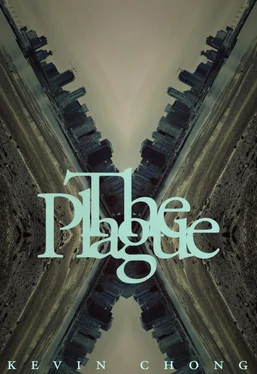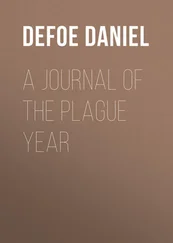After the instructions were recorded, he relaxed. He asked his mother for water, then sipped it slowly from a straw.
Tso’s iPhone was giving out. Grossman handed her the cellphone charger in a bag that also contained a notebook along with other hastily gathered items. Tso had seen Rieux jotting in the notebook in his car, and she’d noticed it on his dining-room table but had never been curious about its contents until she held it in her hands.
She flipped it open and saw their names. “What is this?” Tso asked Rieux.
He grimaced. “A hobby.”
“Why do you refer to everyone by their last name?” she asked.
“To be impartial.”
She shook her head. “It doesn’t work.”
Rieux told her not to read it. He was not done yet. He feared that he wouldn’t ever be done. “Someone needs to tell it,” he told her. “Otherwise it will recede in memory. The way we forget everything. You should write it.”
She frowned in dismay. “I would turn it into something else. Raymond would want to look at it too.” He reached for the notebook, trying to take it back. In doing so, he dragged one of the lines from the machine. “This part with Siddhu, for instance—”
Mrs Rieux had a way of innocently interrupting others. Since her command of English was basic, she often tuned out conversations and forgot to wait for a proper break in a chat before voicing a thought.
“Megan,” she said in Cantonese, “you should go home and rest.” She took the notebook from her. “I will keep this for now.”
Tso walked back to Grossman’s house. She was relieved to have shed her latex gloves, which irritated her skin. She removed her face mask and took in the moist air. A heavy rain had fallen the night before, warming the ground. At Grossman’s, she showered, changed, and ate a sandwich. She had never gotten around to charging her phone. When she returned to the hospital, Rieux’s face was obscured by a respirator. His eyes widened when he saw her. She saw his lips moving. He began to cough. She went to the bed and took his hand.
His fingers looked as though they’d been powdered in coal dust.
“He started babbling shortly after you left,” Grossman explained. Her eyes were swollen. “Then he started coughing. There was blood.”
He looked like someone riding a roller coaster. His other hand was by his side, balled into a fist. He looked ahead into the distance, beyond the room’s glass partition, as though he was gaping at some great drop that he was inching toward.
They tried their best to soothe him. Mrs Rieux wiped his brow with a towel. Tso held her hand over his on the railing. Grossman played music from his iPhone: singer-songwriters with acoustic guitars and harmonicas—Bob Dylan and the Band, Richie Havens, the McGarrigle sisters, Hayden, and Gillian Welch.
Tso had researched end-of-life ceremonies for her book, and during her stint with the Sanitation League, she’d joined hands with family members and priests in prayers and last rites for the dying. She wished that they, if not Rieux himself, could have taken comfort in these rituals. She knew they would be an affront to him.
A doctor came and consulted with a nurse. They decided that Rieux required heavy sedation. His medication was increased, and soon he slumped in rest. She looked at one monitor. She needed a nurse to explain that his blood pressure was dangerously low.
Tso and Grossman decided they should eat. They made salad bar plates and bought bottled water in the cafeteria, then sat by the windows that looked out on a set of grey concrete apartment buildings.
“I don’t think he’s going to make it,” Grossman said.
Tso looked down at her lap. “He’s fighting. I wish I were more optimistic.”
“This is triggering memories of my dad. Only this is worse. Maybe it’s worse because it’s happening now.”
Rieux spent the rest of the day unconscious. His hands grew as dark as eggplants as the infection grew.
“We need to let him pass,” Castello said when she came at ten. “He knew what the risks were. I don’t think he expected to last through it all.”
Grossman took Mrs Rieux back home. Tso remained in a chair. She was supposed to call them should his condition take its final turn.
Tso was woken up by a howling sound. Rieux’s eyes were open but unfocused. She rose and took his blackened hand, but he did not respond to her presence. He shrugged away from her and rolled to his side. He made a noise that grew thinner as the air left his watery lungs for the last time. And then the noise stopped, like a string on a musical instrument that had snapped.
_________
Tso called Grossman, who had stayed with Mrs Rieux. They arrived quickly, as though they had been waiting in another room. It was not yet six o’clock in the morning and still dark outside. The three women wept over Rieux with all the energy they had reserved. They knew this would be the last person they needed to mourn. There was nothing to hold back. Mrs Rieux addressed him by all his childhood pet names, stroking his hair. With all the regret of someone who had withheld a desire until the opportunity had passed, Tso yearned to embrace Mrs Rieux.
She remembered her own mother’s funeral for the first time in a quarter century. Her mother lay in an open casket, eyes closed, and Tso saw with a surprise that she was wearing makeup. This was not her mother, and yet when they closed the casket, Tso needed to be held back from it.
Rieux’s body was already starting to stiffen, but Tso ran her latex-covered fingers over his knee. She cupped his upper arm and brushed his cheek.
And then Tso kissed him through her face mask. A nurse walked in and screamed at her to stop.
Given these hints, some might have already suspected the true identities of our authors. With this story coming to an end, it is time to tear away our masks.
Megan Tso and Raymond Siddhu, the two of us, collaborated on the completion of the project based largely upon the notebooks of Bernard Rieux.
We discussed many different approaches to this chronicle. That we settled on telling our respective stories, along with Rieux’s, in one braided narrative by no means suggests that it has been a seamless process. As the reader can tell from our authorial interjections, disputes arose as we stitched together this book in separate cities between other obligations.
We also felt inclined to openly disagree with or contextualize some of the statements that Rieux made, as his views—though he shied away as much from the term “libertarian” as he did from any other label—could offend readers who might otherwise find him sympathetic. Rieux’s beliefs never hardened into dogma, and he was always receptive to our thoughts on social justice even if he never fully accepted them.
Rieux’s writing style was clinical and based only on his firsthand experience. We chose to honour (for the most part) his formal constructions and his arm’s-length treatment of his characters. His notebook effectively formed the skeleton of this book.
The late doctor wrote about his reflections during the outbreak and quarantine but refused to speculate on what the other figures in his story felt or thought. We decided that we could deepen the impact of this chronicle if we each brought to the story our own personal moments and excavated inner lives. As Rieux wrote between exhausting double shifts, we also suspect that—given the time—he might have infused more of his own interior life to the story upon revision.
Since some of Rieux’s accounts are only fragmentary, we each tried to fill in the gaps in his narrative using our own specific skills. Siddhu brought to the story his reporting background as he interviewed the minor figures in this piece and checked details. Tso pored over the literary works that Rieux was reading and quoting from in his notebooks. She overlaid scenes that were originally written in an objective voice with some of Rieux’s more philosophical ruminations. The omission of most medical details was Rieux’s choice, as he found his own work the least interesting (and possibly, the most dispiriting) aspect of this period.
Читать дальше












